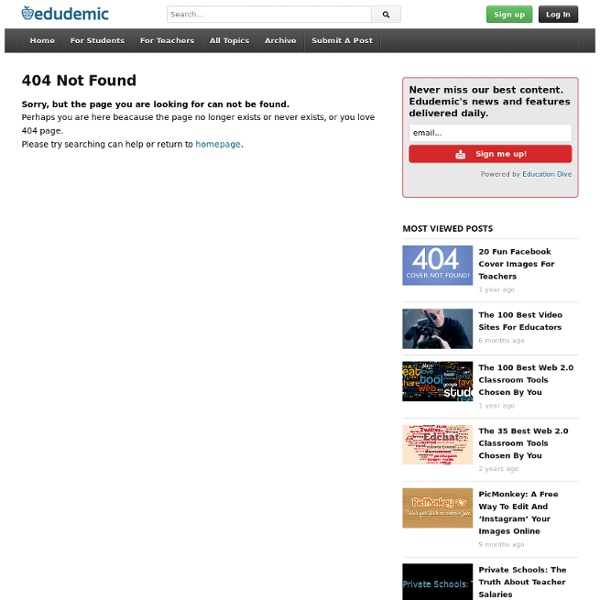



http://edudemic.com/2012/07/best-search-engines/
Related: Search100 Time-Saving Search Engines for Serious Scholars (Revised) Back in 2010, we shared with you 100 awesome search engines and research resources in our post: 100 Time-Saving Search Engines for Serious Scholars. It’s been an incredible resource, but now, it’s time for an update. Some services have moved on, others have been created, and we’ve found some new discoveries, too. Many of our original 100 are still going strong, but we’ve updated where necessary and added some of our new favorites, too. Check out our new, up-to-date collection to discover the very best search engine for finding the academic results you’re looking for.
100 Incredibly Useful and Interesting Web Sites - PCWorld Even as the Web has become more entertaining--and certainly better looking--over the past 15 years, it has also become much more useful and practical, as the 100 sites in this feature will demonstrate. I've organized the sites in the list by the type of task they help you with. It is not a ranking; in each category I recommend sites that specialize in a different area than the others. I've also mixed in a smattering of sites that you might not use every day, but that provide ready answers to specific questions like "How can I learn to rumba?" or "Who should I vote for?" Google Scholar 5 Terrific Twitter Research Tools Twitter has a wealth of data - it's a global thought-stream on every topic imaginable. But how do we convert that raw data into insights, trends and actionable information? How can we find the signal in all that noise? Fortunately, there are several tools out there that can help analyze Twitter data, understand user behavior, and graph it for analysis and presenting to others. Today, we've picked out five great tools to get you started.
Metasearch engine A metasearch engine is a search tool[1][2] that sends user requests to several other search engines and/or databases and aggregates the results into a single list or displays them according to their source. Metasearch engines enable users to enter search criteria once and access several search engines simultaneously. Metasearch engines operate on the premise that the Web is too large for any one search engine to index it all and that more comprehensive search results can be obtained by combining the results from several search engines.
Educational Technology and Mobile Learning: 12 Fabulous Academic Search Engines Coming to you from the wonderful Nova Scotian city, Halifax (Canada), Educational Technology and Mobile Learning is an educational blog dedicated to curating, reviewing and sharing EdTech tools and mobile apps. The purpose is to help teachers and educators effectively integrate digital technologies into their day-to-day teaching, learning and professional development. For any questions regarding the blog website or the published content , please contact EdTech admin, editor and blog owner, Med Kharbach at: info@educatorstechnology.com.
Clustering Engine Carrot2 Search Results Clustering Engine Carrot2 organizes your search results into topics. With an instant overview of what's available, you will quickly find what you're looking for. Choose where to search: Type your query: More options A Guide to Top Academic Search Engines and Databases for Scholars Academic search engines play a very important role in discovering academic resources, scholarly works, journal articles, etc. Below is a guide/ survey of some of the outstanding, free academic search engines. A few of them are inclusive of academic repositories and databases as well. 1.
dutchreleaseteam torrent search Torrentz Age: 1d | 3d | 7d | 1m Quality: any | good | verified 8,654 torrents (0.013s) 100 Search Engines For Academic Research Back in 2010, we shared with you 100 awesome search engines and research resources in our post: 100 Time-Saving Search Engines for Serious Scholars. It’s been an incredible resource, but now, it’s time for an update. Some services have moved on, others have been created, and we’ve found some new discoveries, too. Many of our original 100 are still going strong, but we’ve updated where necessary and added some of our new favorites, too. ICanHazPDF #ICanHazPDF is a hashtag used on Twitter to request access to academic journal articles which are behind paywalls.[1] It began in 2011[2] by scientist Andrea Kuszewski.[3][4] The name is derived from the meme I Can Has Cheezburger?.[4] Process[edit] Users request articles by tweeting an article's title, DOI or other linked information like a publisher's link,[5] their email address, and the hashtag "#ICanHazPDF". Someone who has access to the article will then email it to them.
Quora - Wikipedia Question-and-answer platform The company was founded in June 2009, and the website was made available to the public on June 21, 2010.[6] Users can collaborate by editing questions and suggesting edits to answers that have been submitted by other users.[7] In 2020, the website was visited by 300 million unique people a month.[8] History[edit] Founding and naming[edit] Quora was co-founded by former Facebook employees Adam D'Angelo and Charlie Cheever in June 2009.[3] In an answer to the question "How did Adam D'Angelo and Charlie Cheever come up with the name Quora?"